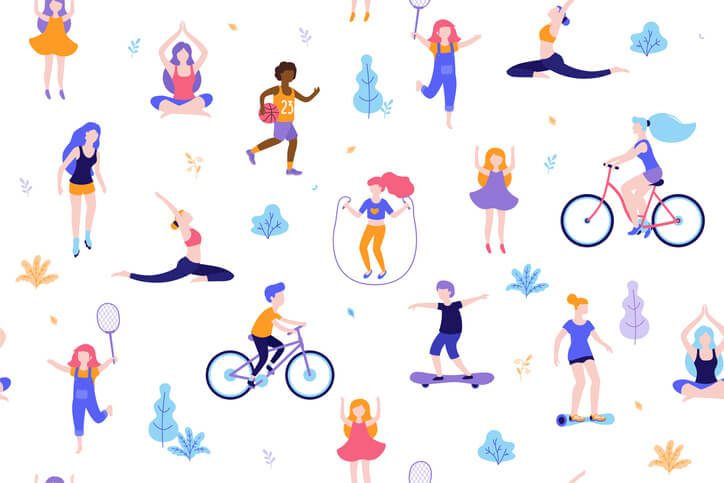A Lack of Exercise May Be the Reason Your Teen Is Hitting the Snooze Button
6 years ago | Physical exercise
By Joy Stephenson-Laws, JD, Founder
Sleep is critical for a healthy life.
According to the National Institute of Neurological Disorders and Stroke, “Sleep is an important part of your daily routine—you spend about one-third of your time doing it. Quality sleep – and getting enough of it at the right times -- is as essential to survival as food and water. Without sleep you can’t form or maintain the pathways in your brain that let you learn and create new memories, and it’s harder to concentrate and respond quickly.”
And there is a significant amount of evidence which suggests that a chronic lack of sleep as well as getting poor quality sleep may cause an increased risk of high blood pressure (hypertension), cardiovascular disease, diabetes, depression and obesity.
Many of us just aren’t getting enough sleep or good quality sleep. The Centers for Disease Control and Prevention (CDC) reports that one in three adults don’t get enough sleep (most adults need seven to nine hours of sleep per night).
We can’t look at getting a full night’s rest as a luxury. It really is a necessity if we want to live our healthiest and happiest lives. As mentioned, a lack of sleep can contribute to the development of some very serious health issues.
Teenagers need about eight to 10 hours of sleep each night. however, many teens are in what some in the medical field call ‘sleep debt.’ Like us grown adults, many teens are not getting sufficient sleep (or even good quality sleep at that). For example, a recent study found evidence suggesting that 73 percent of high school students are not getting enough sleep.
For many, not getting enough sleep may be a choice as a result of living a certain lifestyle. For example, some people may choose to stay up late watching TV or partying.
Then there are those who have issues that may prevent them from getting enough sleep such as insomnia, stress, anxiety and sleep apnea. According to the National Sleep Foundation, many teens suffer from treatable sleep disorders, including insomnia, narcolepsy, restless legs syndrome and sleep apnea.
“Teens tend to have irregular sleep patterns across the week — they typically stay up late and sleep in late on the weekends,which can affect their biological clocks and hurt the quality of their sleep.”
So as parents to teens, it’s important to address any potential sleep disorders and try to encourage them to adopt a consistent sleeping routine.
And one key reason your teen may not be getting enough or good quality sleep appears to be a lack of adequate exercise.
A recent study, conducted by Penn State University, found evidence showing that teens who exercised usually got to sleep earlier, slept longer and had better quality sleep during the night.
To be more specific, according to this report discussing the study, “the team found that for every extra hour of moderate-to-vigorous physical activity, the teens fell asleep 18 minutes earlier, slept 10 minutes longer and had about one percent greater sleep maintenance efficiency that night.”
Sleep is especially important during adolescence. According to one of the lead researchers, during adolescence sleep can affect cognitive and classroom performance, stress and eating behaviors.
Furthermore, “In contrast, the researchers also found that being sedentary more during the day was associated with worse sleep health. When participants were sedentary for more minutes during the day, they fell asleep and woke up later but slept for a shorter amount of time overall.”
Researchers also observed that when teens slept in, they were likely to be more sedentary the next day.
How can we proactive as teen parents?
Nutrition. Nutrition. Nutrition!
Our teens need nutrients, such as water, protein, carbohydrates, fats, vitamins and minerals to help them exercise (so that they can get the best quality of sleep and reach that sleep quota of eight to 10 hours).
Without the proper fuel, their bodies will have difficulty performing to their best physical ability or recover as well post workout. To learn about the nutrients your teen needs for exercise, such as B vitamins, magnesium and calcium, click here.
And sleeping well also requires good nutrition. Check out this pH Labs blog about foods and specific nutrients that may help with sleep duration and quality.
Finally, make sure your teen takes routine nutrient tests. Nutritional imbalances can contribute to sleep issues and other health issues. If the test shows your teen has too much or too little of a certain nutrient, a competent healthcare professional can help with making the necessary dietary changes and recommend quality supplements where appropriate.
Enjoy your healthy life!
The pH professional health care team includes recognized experts from a variety of health care and related disciplines, including physicians, attorneys, nutritionists, nurses and certified fitness instructors. This team also includes the members of the pH Medical Advisory Board, which constantly monitors all pH programs, products and services. To learn more about the pH Medical Advisory Board, click here.







